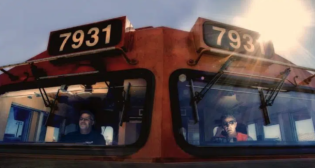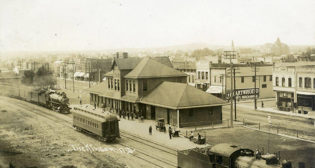
No, Mr. Munoz, arm grabbing also is improper
Written by Frank N. Wilner, Capitol Hill Contributing EditorAs United Airlines is learning, the grabbing by the arms of a fare-paying, law-abiding 69-year-old passenger, and forcibly dragging him through the aisle for removal from an aircraft for no reason other than United having overbooked the Chicago-Louisville flight and wishing to put a more favored fanny in the seat, is a public relations nightmare—and not to be treated as any less offensive than the preferred method of body-part grabbing by the current President of the United States.
That United’s CEO, Oscar Munoz, who is defending his employees’ actions, previously was president and chief operating officer of railroad giant CSX, reminds us that such horrific treatment of passengers is not restricted to United, or even to airlines.
Three railroad episodes—two involving U.S. congressmen, and two for no other reason than racial discrimination—remain stains on the rail industry.
In August 1969, shortly after receiving from the Interstate Commerce Commission (ICC) authority to discontinue a money-losing passenger train, Chicago, Burlington & Quincy Railroad (now part of BNSF) halted that train in a Nebraska cornfield, ordered all passengers off the train, and escorted them through a corn field to waiting buses the railroad had procured.
Among the rousted passengers was seven-term Nebraska Republican Congressman Glenn Cunningham, a member of the House Commerce Committee that then held regulatory oversight of the ICC. What otherwise would have been a rude inconvenience, owing then to the lack of instant-video via social media, turned into front page news because of Cunningham’s involvement.
An enraged Cunningham eventually gained access to a telephone—and the call wasn’t to family members. Within hours of the railroad’s abrupt halting of the train and forced disgorgement of its fare-paying passengers, the ICC issued a press release: “Yesterday’s action … was taken without the knowledge of the Interstate Commerce Commission. The ICC will not condone such treatment of the traveling public.”
Contemporaneously, Supreme Court Justice Hugo Black signed an order restoring the annulled train pending outcome of further litigation.
 The brutally man-handled and humiliated United Airlines passenger, whose “crime” was not wishing to relinquish a seat for which he reserved and paid, may not have such friends in high places as did Congressman Cunningham, but he does have something more powerful in his corner—social media, as we are witnessing.
The brutally man-handled and humiliated United Airlines passenger, whose “crime” was not wishing to relinquish a seat for which he reserved and paid, may not have such friends in high places as did Congressman Cunningham, but he does have something more powerful in his corner—social media, as we are witnessing.
Social media, however, wasn’t yet available to halt, correct or assuage two instances of blatant discrimination on passenger trains.
The same year the ICC was created in 1887, African-American clergyman William H. Councill, principal of the Alabama State Normal School in Huntsville, complained that after purchasing a first-class ticket in Chattanooga, Tenn., on Western & Atlantic Railroad (now owned by the State of Georgia and leased to CSX), for a trip to Atlanta, he was beaten on the head with a lantern and evicted from the first-class passenger car.
Councill’s subsequent complaint to the ICC of forcible removal was rejected in a decision written by Commissioner William R. Morrison that held, in part, “Colored people may be assigned separate cars on equal terms without disadvantage to either race and with increased comfort to both.” Commissioner Morrison, who had fought for the Union Army in the Civil War, was a former Democratic speaker of the Illinois (Land of Lincoln) House of Representatives, an eight-term U.S. congressman and served on the ICC from 1887 to 1897.
Then in 1937, Arthur W. Mitchell, a Tuskegee Institute and Ivy League (Columbia and Harvard) educated Chicago attorney and four-term Congressman from Illinois, suffered a similar ICC setback. He complained of being denied by Chicago, Rock Island & Pacific Railway (subsequently liquidated) of first-class passenger accommodations between Memphis and Hot Springs, Ark., solely because of his skin color.
The ICC dismissed the complaint, ruling it must recognize state law permitting segregation, and that there was not sufficient demand for first-class travel by people of color to warrant separate facilities.
Commissioners Clyde B. Aitchison, William E. Lee and Claude R. Porter dissented, jointly writing: “If the action complained of does not constitute undue or unreasonable prejudice or disadvantage under the Interstate Commerce Act, as those terms are understood, then [we are] at a loss to understand their meaning.”
Congressman Mitchell’s appeal reached the Supreme Court, which reversed the ICC, holding that denial of equality of accommodations because of race is an invasion of a fundamental individual right guaranteed against state action by the Fourteenth Amendment.
But the Court also upheld the “separate but equal” delusion not struck down until 1954 in the case of Brown vs. Board of Education. In 1937, however, the Court meekly surrendered to bigotry, saying only that “colored persons who buy first-class tickets must be furnished with accommodations equal in comforts and conveniences to those afforded to first class white passengers.”
In 1955, a year following the Brown vs. Board of Education Supreme Court ruling, the ICC held, in a case involving St. Louis-San Francisco Railway (now part of BNSF), that the very practice of segregation in interstate commerce “subjects Negro passengers to undue and unreasonable prejudice and disadvantage in violation [of the Interstate Commerce Act]. Dissenting was Commissioner J. Monroe Johnson of South Carolina, who wrote, “It is my opinion that the ICC should not … become a pioneer in the sociological field.” Johnson was hired by Atlantic Coast Line Railroad (now part of CSX) following his ICC service.
More bizarre with the United Airlines unpleasantness of April 10 is that the roughed-up passenger, appearing more than slightly disheveled and certainly muddled, is seen in a video returning to his seat following his “reeducation” by the United employees later praised by Munoz for enforcing airline policy.
Following that curious praise of his foot soldiers, Munoz, in his best impression of Donald J. Trump’s thumbs-before-brains use of Twitter, distributed an official statement allegedly apologizing for having to “re-accommodate” the passenger. Comedian Jimmy Kimmel likened the re-accommodation of the passenger by United to the “re-accommodation” of Mexico drug kingpin El Chapo to a U.S. prison.
The assertion of “re-accommodation” is also remindful of the court-examination by attorney William Kunstler of Chicago Mayor Richard Daley following the 1968 Democratic National Convention, where Chicago police were accused of brutally attacking demonstrators. After Mayor Daley asserted his police had “given every courtesy and hospitality” to demonstrators, Kunstler asked, “Did you consider that the use of nightsticks on the heads of demonstrators was hospitable?”
For transmission to the public of that apology from Mr. Munoz, we present to Charlie Hobart, the United Airlines public relations employee so humbled, the “Sean Spicer Award for The Best Straight-Faced Delivery of a Boss’s Inanity.”
Editor’s note: The man dragged off the United plane is a Chinese doctor. He was one of four passengers United claims it randomly selected for an “involuntary de-boarding situation” because four crew members needed to get to a flight departing from Louisville, otherwise it would be canceled.
According to CNN, the man said “he was a doctor and needed to see patients. The airline said it then followed U.S. Department of Transportation protocol in calling local law enforcement to forcibly remove the man from the plane after he refused to disembark. The Chicago Department of Aviation said in a statement that the incident ‘was not in accordance with our standard operating procedure and the actions of the aviation security officer are obviously not condoned by the department.’”
United’s cruel treatment of the man went viral on social media and has sparked an international incident. It was the number one trending topic April 11 on Weibo (China’s Twitter), attracting more than 100 million views. United denied accusations the man was chosen based on his ethnicity. Joe Wong, a Chinese-born comedian who has performed multiple times on the Late Show with David Letterman, said on Weibo, “Many Chinese people feel they’ve been subject to discrimination. They stay silent because they fear losing face. That’s why the Western mainstream media and public don’t take discrimination against Asians seriously.”
China is the second-largest aviation market in the world and an important one for United, which advertises that it “operates more nonstop U.S.-China flights, and to more cities in China, than any other airline.”
#NewUnitedAirlinesMottos was the number one trending topic on Twitter in the U.S., and the third trending topic worldwide, with commenters suggesting new United slogans such as “Not enough seating, prepare for a beating.”
I’ve been a United customer (and before the merger, a Continental customer) for 30 years. I’d change airlines if I thought I’d get better service elsewhere, but what’s the point? With the exception of Porter Airlines (at least for now) and possibly a few other small, regional carriers, they all are pretty bad. — William C. Vantuono



